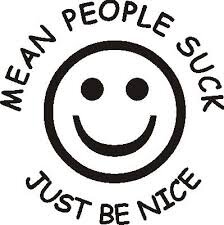Not long ago while driving on a traffic-engorged freeway, a red Honda Civic cut in front of me so close I had to slam on my brakes to keep my F150 from ramming him. Yeah, likely lost a number of miles of tread with the skid. And I got close enough to read the sticker on his rear window: “Mean People Suck.” Honestly, the humor of the hypocrisy mellowed my madness somewhat. Somewhat.
About then, I came across a study from UCLA. No, not the same title as this post, but it claims “being nice to others reduces depression and the risk of cancer and cardiovascular disease…Research by UCLA scientists already has shown that mindfulness and kindness actually alter the behavior of genes, turning down those that promote inflammation, which can lead to heart disease or certain cancers, and turning up the activity of genes that protect against infections.”
So, be kind. Not mean. Smile like you get a buck for each one you give. Support your local food pantry. Don’t cut people off on the freeway as you wait for a safe opening. The UCLA study defines kindness as “an act that enhances the welfare of others as an end in itself.” I like that—be kind for kindness sake, so be creative in creating kindness.
And the more kind you are, the healthier you become. But I can give an even more significant result. First, we’re commanded to avoid meanness and embrace kindness, “Get rid of all bitterness, rage and anger, brawling and slander, along with every form of malice. Be kind and compassionate to one another, forgiving each other, just as in Christ God forgave you” (Ephesians 4:31-21). We choose bitterness or kindness. UCLA says be kind, it benefits you. God says be kind, that also benefits you, “Be imitators of God, therefore, as dearly loved children and live a life of love” (the next two verses, in Ephesians 5:1-2).
Notice the “therefore” that follows eliminating bitterness and adding kindness. When we do, we imitate God. We become more godly. Maybe we can start a kindness revolution.
Kick Starting the Application
Do you typically respond to bad acts with kindness or anger? Have you explored the spiritual implications of that? (By the way, this convicts me to a huge degree). What causes you to respond as you do? Will you try to put this into practice? Maybe do an intentional act of kindness each day for the next week? Then, see how your attitude changes, and try to increase the frequency.
PS If you’d like to read the entire article, please go to https://www.latimes.com/california/story/2019-09-24/ucla-bedari-kindness-institute-launch?utm_source=Today%27s+Headlines&utm_campaign=8e284d4ed9-EMAIL_CAMPAIGN_2016_12_12_COPY_01&utm_medium=email&utm_term=0_b04355194f-8e284d4ed9-83385853
